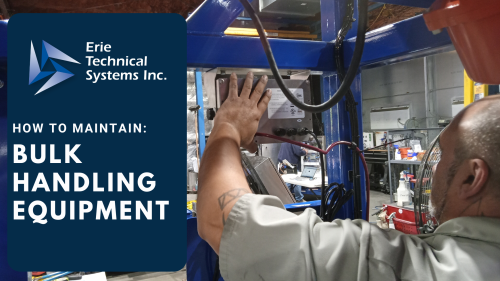How to Maintain Your Bulk Handling Equipment for Long-Term Efficiency
Proper maintenance and upkeep can increase your productivity but also reduce downtime. Effective maintenance is essential, especially when it involves complex machinery used in bulk handling, bulk filling, and managing flexible intermediate bulk containers (FIBCs). This guide will walk you through the best practices for maintaining your bulk handling equipment, focusing on strategies that enhance long-term efficiency.
Understanding Bulk Handling Maintenance
Bulk handling systems, including conveyors, fillers, and unloaders, are integral to industries ranging from food processing to chemicals and agriculture. These systems are designed to handle large quantities of materials efficiently, but their operational effectiveness can be compromised by wear and tear, material build-up, and mechanical failures. Regular maintenance extends the life of your equipment and ensures it runs efficiently and safely.
Key Maintenance Strategies
Regular Inspection and Monitoring
Routine inspections are crucial for catching issues before they lead to equipment failure. Schedule daily, weekly, and monthly inspections based on the manufacturer's recommendations and usage intensity. Look for signs of wear, check for loose components, and listen for unusual noises. At Erie Technical Systems, we design our equipment with accessibility in mind, making these inspections straightforward and less time-consuming.
Cleaning Protocols
Residue from bulk materials can lead to build-up that affects the functionality and efficiency of your equipment. Establish a cleaning schedule that fits the type of materials you handle. For bulk fillers and unloaders used in food processing, it is important to ensure the cleaning procedures meet food safety standards. ETSI's equipment often includes features that simplify cleaning, such as easily removable parts and access panels.
Lubrication
Proper lubrication reduces friction in moving parts, decreasing wear and extending the life of machinery. Check the manufacturer's manual for specific lubrication requirements and ensure you use the right type of lubricant. Ideally, your bulk handling equipment would be designed with high-quality components and those components may require specific lubricants to maintain optimal performance.
Component Replacements
Wear and tear on mechanical parts are inevitable. Having a regular replacement schedule for parts like belts, bearings, and seals can prevent breakdowns. You can always reach out to us to find exact replacements to these parts to guarantee compatibility and reliability. Keeping a stock of critical spare parts on hand can also minimize downtime during unexpected repairs.
Employee Training
Well-trained operators can significantly impact the efficiency and longevity of bulk handling equipment. Ensure that all personnel are trained on the proper operation, maintenance, and safety procedures.
Upgrades and Modernizations
Stay updated with the latest technology and consider upgrades that can improve efficiency and handling capabilities. We continually innovate our product offerings, and upgrading older systems can lead to significant improvements in operational efficiency.
Real-World Applications and Benefits
Implementing these maintenance strategies can lead to numerous benefits:
Reduced Operational Costs: Efficient machines use less energy and require fewer repairs.
Increased Productivity: Well-maintained equipment minimizes downtime and maximizes throughput.
Improved Safety: Regular maintenance reduces the risk of accidents caused by equipment failure.
Maintaining your bulk handling equipment is not just about following a checklist; it's about understanding the importance of each step in preventing downtime and extending the life of your machinery. At Erie Technical Systems, our commitment to quality and service excellence provides a solid foundation for any business looking to optimize its bulk handling operations. By adhering to these maintenance practices, you can ensure that your bulk manufacturing processes remain efficient and productive over the long term. Ready to take the next steps on a bulk filling system?

